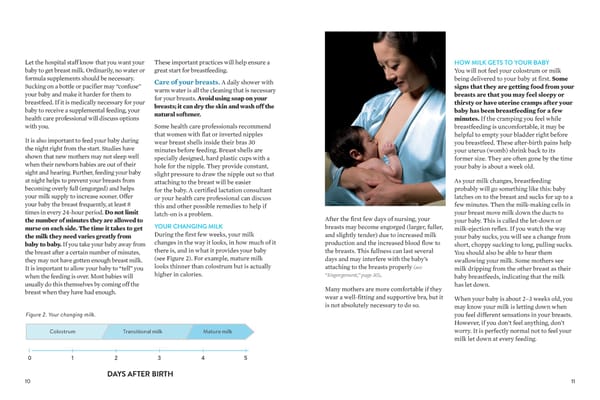Let the hospital staff know that you want your These important practices will help ensure a HOW MILK GETS TO YOUR BABY baby to get breast milk. Ordinarily, no water or great start for breastfeeding. You will not feel your colostrum or milk formula supplements should be necessary. Care of your breasts. A daily shower with being delivered to your baby at first. Some Sucking on a bottle or pacifier may “confuse” warm water is all the cleaning that is necessary signs that they are getting food from your your baby and make it harder for them to for your breasts. Avoid using soap on your breasts are that you may feel sleepy or breastfeed. If it is medically necessary for your breasts; it can dry the skin and wash off the thirsty or have uterine cramps after your baby to receive a supplemental feeding, your natural softener. baby has been breastfeeding for a few health care professional will discuss options minutes. If the cramping you feel while with you. Some health care professionals recommend breastfeeding is uncomfortable, it may be It is also important to feed your baby during that women with flat or inverted nipples helpful to empty your bladder right before the night right from the start. Studies have wear breast shells inside their bras 30 you breastfeed. These after-birth pains help shown that new mothers may not sleep well minutes before feeding. Breast shells are your uterus (womb) shrink back to its when their newborn babies are out of their specially designed, hard plastic cups with a former size. They are often gone by the time sight and hearing. Further, feeding your baby hole for the nipple. They provide constant, your baby is about a week old. at night helps to prevent your breasts from slight pressure to draw the nipple out so that attaching to the breast will be easier As your milk changes, breastfeeding becoming overly full (engorged) and helps for the baby. A certified lactation consultant probably will go something like this: baby your milk supply to increase sooner. Offer or your health care professional can discuss latches on to the breast and sucks for up to a your baby the breast frequently, at least 8 this and other possible remedies to help if few minutes. Then the milk-making cells in times in every 24-hour period. Do not limit latch-on is a problem. your breast move milk down the ducts to the number of minutes they are allowed to After the first few days of nursing, your your baby. This is called the let-down or nurse on each side. The time it takes to get YOUR CHANGING MILK breasts may become engorged (larger, fuller, milk-ejection reflex. If you watch the way the milk they need varies greatly from During the first few weeks, your milk and slightly tender) due to increased milk your baby sucks, you will see a change from baby to baby. If you take your baby away from changes in the way it looks, in how much of it production and the increased blood flow to short, choppy sucking to long, pulling sucks. the breast after a certain number of minutes, there is, and in what it provides your baby the breasts. This fullness can last several You should also be able to hear them they may not have gotten enough breast milk. (see Figure 2). For example, mature milk days and may interfere with the baby’s swallowing your milk. Some mothers see It is important to allow your baby to “tell” you looks thinner than colostrum but is actually attaching to the breasts properly (see milk dripping from the other breast as their when the feeding is over. Most babies will higher in calories. “Engorgement,” page 30). baby breastfeeds, indicating that the milk usually do this themselves by coming off the Many mothers are more comfortable if they has let down. breast when they have had enough. wear a well-fitting and supportive bra, but it When your baby is about 2–3 weeks old, you is not absolutely necessary to do so. may know your milk is letting down when Figure 2. Your changing milk. you feel different sensations in your breasts. However, if you don’t feel anything, don’t Colostrum Transitional milk Mature milk worry. It is perfectly normal not to feel your milk let down at every feeding. 0 1 2 3 4 5 DAYS AFTER BIRTH 10 11
 Breastfeeding Guide Page 5 Page 7
Breastfeeding Guide Page 5 Page 7